Related Research Articles

The Yom Kippur War, also known as the Ramadan War, the October War, the 1973 Arab–Israeli War, or the Fourth Arab–Israeli War, was an armed conflict fought from 6 to 25 October 1973 between Israel and a coalition of Arab states led by Egypt and Syria. The majority of combat between the two sides took place in the Sinai Peninsula and the Golan Heights—both of which were occupied by Israel in 1967—with some fighting in African Egypt and northern Israel. Egypt's initial objective in the war was to seize a foothold on the eastern bank of the Suez Canal and subsequently leverage these gains to negotiate the return of the rest of the Israeli-occupied Sinai Peninsula.
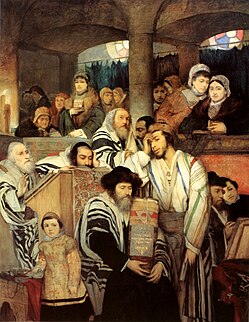
Yom Kippur is the holiest day of the year in Judaism. Its central themes are atonement and repentance. Jews traditionally observe this holy day with a day-long fast, confession, and intensive prayer, often spending most of the day in synagogue services. The High Holy Days comprise both Rosh HaShanah and Yom Kippur.
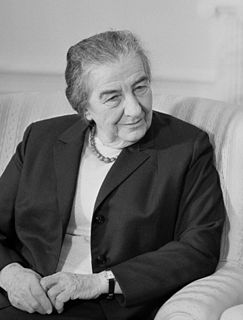
Golda Meir was an Israeli politician, teacher, and kibbutznikit who served as the fourth prime minister of Israel from 1969 to 1974. She was the first woman to become head of government in Israel.
Kol Nidre is a Hebrew and Aramaic declaration which is recited in the synagogue before the beginning of the evening service on every Yom Kippur. Strictly speaking, it is not a prayer, even though it is commonly spoken of as if it is a prayer. This declaration and its ceremonial accompaniment have been charged with emotional undertones since the medieval period, creating a dramatic introduction to Yom Kippur on what is often dubbed "Kol Nidrei night", with the entire Yom Kippur evening service popularly called Kol Nidrei.
Shalom aleichem is a spoken greeting in Hebrew, meaning "peace be upon you". The appropriate response is aleichem shalom. The plural form "עֲלֵיכֶם" is used even when addressing one person.

Tishrei or Tishri is the first month of the civil year and the seventh month of the ecclesiastical year in the Hebrew calendar. The name of the month is Babylonian. It is a month of 30 days. Tishrei usually occurs in September–October on the Gregorian calendar.
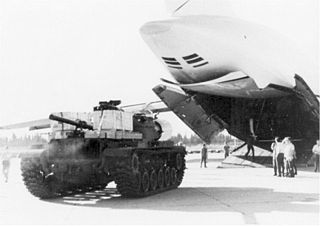
Operation Nickel Grass was a strategic airlift operation conducted by the United States to deliver weapons and supplies to Israel during the 1973 Yom Kippur War. Over 32 days, the United States Air Force (USAF) Military Airlift Command (MAC) shipped 22,325 tons of tanks, artillery, ammunition and supplies in C-141 Starlifter and C-5 Galaxy transport aircraft between 14 October and 14 November 1973. The U.S. support helped ensure that the State of Israel survived a coordinated and surprise attack from the Soviet-backed Arab Republic of Egypt and Syrian Arab Republic.

The Ten Days of Repentance are the first ten days of the Hebrew month of Tishrei, usually sometime in the month of September, beginning with the Jewish High Holy Days of Rosh Hashanah and ending with the conclusion of Yom Kippur.
The Agranat Commission was a National Commission of Inquiry set up to investigate failings in the Israel Defense Forces in the prelude to the Yom Kippur War, when Israel was found unprepared for the Egyptian attack against the Bar Lev Line and a simultaneous attack by Syria in the Golan—the first phase in a war in which 2,812 Israeli soldiers were killed.
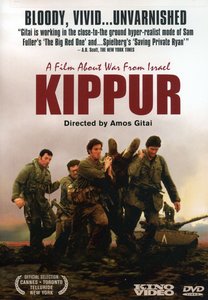
Kippur (כיפור) is a 2000 Israeli drama war film directed by Amos Gitai. The storyline was conceived from a screenplay written by Gitai and Marie-Jose Sanselme; based on Gitai's own experiences as a member of a helicopter rescue crew during the 1973 Yom Kippur War. The film stars actors Liron Levo, Tomer Russo and Uri Klauzner in principal roles.
The Geneva Conference of 1973 was an attempt to negotiate a solution to the Arab–Israeli conflict as envisioned in United Nations Security Council Resolution 338 following the called-for cease-fire to end the Yom Kippur War. After considerable "shuttle diplomacy" negotiations by Henry Kissinger, the conference opened on 21 December 1973 under the auspices of the United Nations Secretary General, with the United States and the USSR as co-chairmen. The foreign ministers of Egypt, Jordan and Israel were in attendance. The table with Syria's nameplate remained unoccupied, although Syria had indicated possible future participation. Each foreign minister spoke, mainly directed to their domestic audiences rather than to each other. Kissinger articulated his step-by-step strategy and stated that the goal of the conference was peace; the immediate need was to strengthen the cease-fire by accomplishing a disengagement of forces as the "essential first step" toward implementation of UN 242. The meeting was then adjourned.

The three-line United Nations Security Council Resolution 338, adopted on October 22, 1973, called for a ceasefire in the Yom Kippur War in accordance with a joint proposal by the United States and the Soviet Union. The resolution stipulated a cease fire to take effect within 12 hours of the adoption of the resolution. The "appropriate auspices" was interpreted to mean American or Soviet rather than UN auspices. This third clause helped to establish the framework for the Geneva Conference (1973) held in December 1973.

Rosh HaShanah is the Jewish New Year. The biblical name for this holiday is Yom Teruah, literally "day of shouting or blasting." It is the first of the Jewish High Holy Days, as specified by Leviticus 23:23–25, that occur in the late summer/early autumn of the Northern Hemisphere. The High Holy Days comprises both Rosh HaShanah and Yom Kippur.

There are several Jewish and Hebrew greetings, farewells, and phrases that are used in Judaism, and in Jewish and Hebrew-speaking communities around the world. Even outside Israel, Hebrew is an important part of Jewish life. Many Jews, even if they do not speak Hebrew fluently, will know several of these greetings.
Christian observances of Yom Kippur occur when a Christian-style Day of Atonement models itself on the Jewish holiday of Yom Kippur.
Events in the year 1973 in Israel.
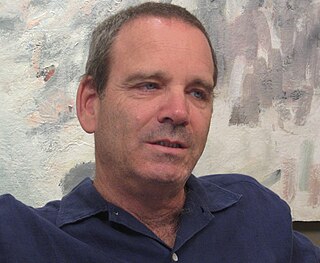
Uri Bar-Joseph is professor emeritus in the Department for International Relations of The School for Political Science at Haifa University. He specializes in national security, intelligence studies, and the Arab-Israeli conflict.
Yom tov sheni shel galuyot, also called in short yom tov sheni, means "the second festival day in the Diaspora", and is an important concept in halakha. The concept refers to the observance of an extra day of Jewish holidays outside of the Land of Israel.

A wave is a nonverbal communication gesture that consists of the movement of the hand and/or entire arm that people commonly use to greet each other, but it can also be used to say goodbye, acknowledge another's presence, call for silence, or deny someone. The wave gesture is an essential element of human language.
References
- 1 2 Gulf News "Link up with others with a greeting on World Hello Day", November 15, 2008
- ↑ USA Today "Looking Ahead", November 20, 2008
- ↑ The Baltimore Sun , "'Hello' circle world today", November 21, 1981, page A3
- 1 2 "Bonjour, Hola, Shalom: Michael McCormack, Founder of World Hello Day". The Crimson . Retrieved May 2, 2015.